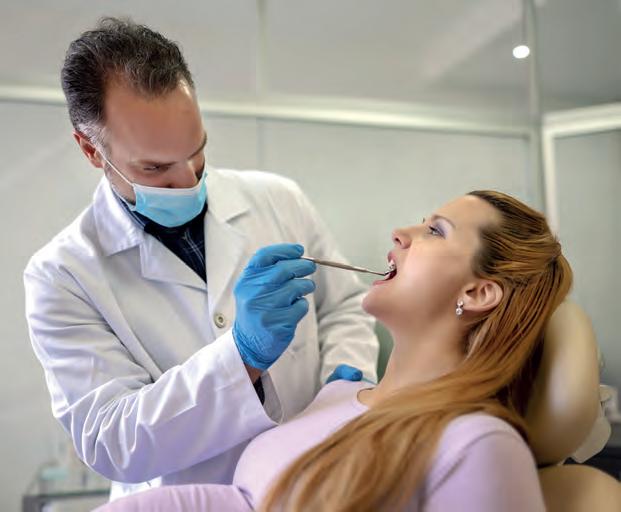
4 minute read
JUST ASK
from Connect Magazine
Our teams answer your questions
Healthy eating
QWhyisn’ttherea recommendeddietfor peoplewithCrohn’sorColitis?
Researchers agree that diet is important in Crohn’s and Colitis. We know that a liquid diet (exclusive enteral nutrition) can help get Crohn’s under control, but apart from that there is not much high-quality evidence to say exactly what foods could be helpful and what foods could be harmful.
It is also something that may vary a lot from person to person. Some people find that certain foods make their symptoms worse, while the same foods might not cause any problems for another person. As such, there is not any particular diet that works for everyone.
There is lots of research being done on the effects of food, but it’s hard to get definite answers.
Research on food and health is difficult because what we eat varies a lot depending on our age, where we live, our cultural background, how active we are and what we like – what one person thinks of as a ‘normal’ diet might not be the same for someone else.
This can make it difficult to work out the impact of diet on chronic health conditions.
Food research often uses questionnaires to find out what the people taking part have eaten. However, it’s hard to keep a record of exactly what you eat because every meal contains so many different ingredients.
It can also be difficult to remember everything you’ve eaten, especially if the questionnaire covers a long period of time. And unless you weigh all your food, you will not know exactly how much of everything you’ve had. Even if two people record having the same meal, they might have used different ingredients, different brands or different cooking methods.
All these things make it difficult to prove whether particular foods do, or do not, help people with Crohn’s or Colitis.
Test results
QWhat does my faecal calprotectin level mean?
Calprotectin is a protein that is released by white blood cells when there is inflammation in your gut. A faecal calprotectin test measures the level of calprotectin in a sample of your poo. The results of this test can show whether you have inflammation in your gut, but not what causes it.
Faecal calprotectin tests can be used to:
• Rule out other conditions when you are getting a diagnosis of Crohn’s or Colitis
• Predict and prevent flare-ups
• Check how well you are responding to treatments
Different hospitals and clinics use different measurements, but above 100–250ug/g (micrograms of calprotectin per gram of poo) is usually considered a raised level.
A raised level suggests that you have inflammation in your gut, but this can also be caused by other conditions, such as an infection or tummy bug (gastroenteritis).
If you have a raised level of calprotectin, your doctor or IBD team will tell you what the next steps are. They may refer you for further tests and investigations to find out where exactly the inflammation is and what is causing it. They may also want to discuss changing or stopping your treatment if it isn’t working well for you.
When you read your test results, you might find your results are compared to a reference range. These ranges are based on the typical ‘normal’ test results of a large group of healthy people. You might find that your faecal calprotectin level seems higher or lower than you were expecting, but results can mean different things for different people. If you need help interpreting your test results, ask your doctor or IBD team.
Mouth matters
QCan Crohn’s or Colitis affect my oral health?
People with Crohn’s or Colitis are more likely to have mouth and tooth problems than people without these conditions. In fact, some people might get mouth problems before they experience gut symptoms. These can include:
• Mouth ulcers
• Swelling or lumps in your lips, face, tongue, gums or the inside of your cheeks
• Gum disease
• Sores at the corner of your mouth
• White or yellow spots inside your mouth (a condition called pyostomatitis vegetans)
• Swelling of the gums and lips with ulcers in the lining of your mouth (a condition called orofacial granulomatosis)
• Yeast infections
• Tooth decay
• Dry mouth
• Smelly breath
• Changes in taste
Scientists think tooth and mouth problems in people with Crohn’s or Colitis could be due to a combination of things, such as:

• The conditions themselves
• Changes in your immune system
• Changes in the bacteria that live in your mouth
• Changes in your diet
• Side effects of treatments
• Low levels of vitamins and minerals mouthwash. If you have inflammation or ulcers, a steroid might help.
Occasionally, you might need other treatments. These depend on the exact problem you have and what has caused it. For example, a mouth infection might need antibiotic or antifungal treatment. If your problem is caused by low levels of vitamins or minerals, you may need to take supplements. If it is a side effect of your treatment, your IBD team might suggest stopping or switching medicines. To help prevent tooth and mouth issues, you could try:
• Going for regular check-ups with a dentist
• Brushing your teeth with a fluoride toothpaste
• Using fluoride mouthwash
Most of the time, getting your Crohn’s or Colitis under control helps with mouth problems, and no special treatment is needed. However, if your mouth is very sore, your GP or IBD team may prescribe a pain-killing gel or
• Reducing the amount of sugar you eat (but try to avoid artificial sweeteners because they can cause diarrhoea) to people around me, saying I didn’t have a stoma bag or a scar.
That’s why, when I got out of that relationship, I started raising awareness and became passionate about breaking stigmas and making changes. I have gone through a journey to acceptance of my body. I’m never going to let anyone feel the way I was made to feel.
3
Making An Impact
The reaction to the video I made for Crohn’s & Colitis UK’s early diagnosis campaign was incredible.
Friends and family had all shared that journey with me, but hearing the effect it had on strangers who’d seen it online, I realised how important it is to keep fighting for others, breaking down barriers to diagnosis, and tackling stigma.










